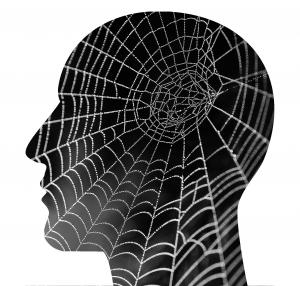
I began thinking about applying for disability in 2012. I had lost my job after a bad manic episode. At that time my mom was battling inflammatory breast cancer as well, and my children had just returned from a four year stay in Senegal with their father’s family. Stressed out doesn’t even come close to my mental state at the time. I simply couldn’t work under those conditions. I couldn’t even get off my couch or take care of myself in any capacity. I had no concept of functional self-care in any sense and I was barely lucid. After my mom passed away in early 2013, I became completely unstable. I went into a psychotic depression, sleeping off and on for several months. I was paranoid and delusional. I lashed out at those around me, accusing them of the worst things imaginable. My behavior was almost unrecognizable, and yet no one suggested I go to the hospital or even to my psychiatrist to get evaluated. They just lectured me to get myself together and stop acting out. Days merged into nights and I never knew what time it was or even the month. I developed bronchitis and then pneumonia but I still never left my house. I was too psychologically unwell. My primary care doctor was able to get antibiotics to my house as she knew I’d never make it to the emergency room for treatment.
At some point that winter, I finally decided to contact an attorney to help me file the paperwork for my disability claim because I knew I couldn’t complete it on my own. I remember telling the clerk I felt so poorly that if someone offered me a salary to simply staple papers all day, I’d have to decline because I didn’t have the energy to operate the stapler. I just couldn’t do anything productive. Even breathing was painful. I wanted to die. It took me 2 long years before I was able to get a hearing with a disability judge. My case was denied twice before that time. It was decided that I was sick, but not sick enough for disability. So I wanted to plead my case in front of a judge to see what would happen. On the day of my hearing, I was extremely nervous. Someone offered me a ride to the courthouse, because by this time I had stopped driving. I didn’t live on my own anymore either; I was staying with a family friend until I got back on my feet. Losing my mom took everything out of me. I was a shell of a person. Going to the courthouse was scarier than I thought it would be. My social anxiety was raging that day.
When it was my turn to go into the courtroom, my knees turned to jelly. I thought I was going to be sick. My attorney escorted me into the large room and showed me to the table where I would sit for the next hour. There were several people in the room already: The judge, the court reporter, a spectator/another disability lawyer, someone reviewing my case, and then my attorney. It was overwhelming and frightening. I felt like I was on display and I immediately wanted to run from the room screaming. But I couldn’t. I felt trapped. I sat at the table and shakily poured myself a glass of water. But I was too nervous to drink it. My attorney sat at an adjacent table. The judge introduced herself and explained why we were all there. She tried to put me at ease but it only made my anxiety worse. She asked me to begin telling my story and explain how I had come to be hampered by my mental illness. She wanted me to recount what had gone on for the last two years. But what scared me was that she had my medical records in front of her. How could I possibly remember all of that? I started talking and began stuttering right away. I do that when I’m nervous. Everybody in the room looked at me, puzzled. That made me more anxious and I continued stammering. I couldn’t stop. It was hard for me to put together a coherent sentence. My attorney looked so confused. Just a few minutes ago I was speaking clearly and without stuttering. I could tell she didn’t know what had happened and if I was faking my stutter. I was so embarrassed, but I had to keep talking. It was excruciating. My face was so hot, I thought it would explode. It felt like I was talking for hours. When I was done, the judge asked me a bunch of questions. I felt defensive and angry. If my medical history was right there, why was I being cross examined? It made me feel like a criminal. I was sad and humiliated. Everybody in the room could hear my most personal medical details; the worst parts of my disorder and what it had done to me. I’ve never been so ashamed in my life. I knew the judge wasn’t trying to hurt me and yet I felt demoralized by her pointed questions. All this in order to determine if my mental illness was in fact debilitating and disabling. This wasn’t fun at all. When it was finally over, she concluded that my medical records supported what I had testified to and that she would make a ruling in about 6 weeks. My attorney said that was a positive sign that things had gone in our favor.
In the end, I was declared fully disabled and entitled to benefits. But the point of my story is that when I hear people speak disparagingly about those receiving help from the state, it traumatizes me all over again. That was one of the worst experiences of my life. It was bad enough to have to live like that for those years. In a fog of complete mental instability and confusion. But then to have to recount it in a room full of people as though I was on trial was something that hurt in a way I can’t explain. I don’t mind being disabled by my mental illness. But when I think about that day, I hate my disorder and what it’s done to my life. I hate that I had to tell a group of people about my illness in that way because it isn’t readily visible and obvious. That’s what hurts and shames me. And that’s what I resent about the disability process.












